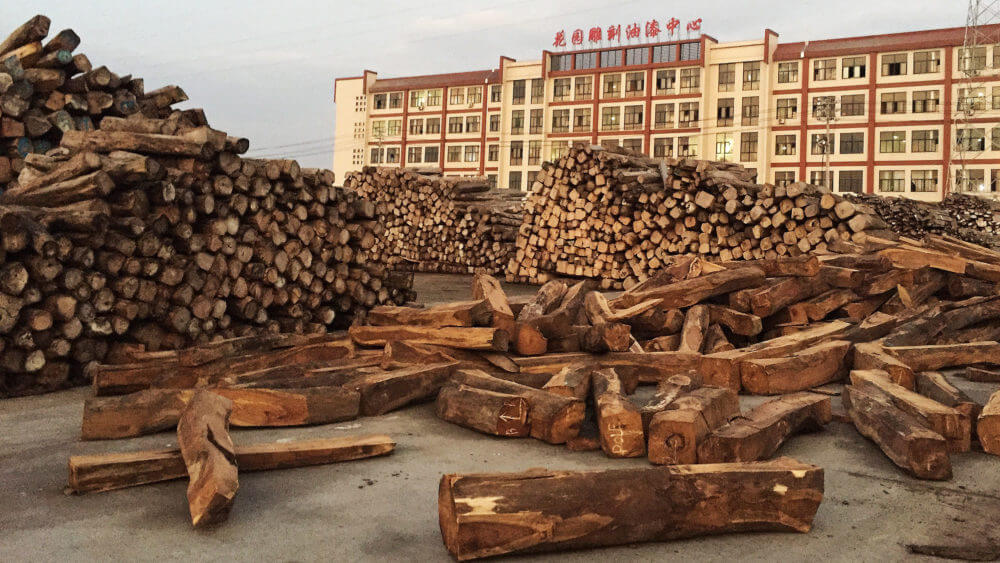The World Wildlife Fund (WWF) has released a report saying that, while levels of deforestation in Cameroon and the Central Africa region at large aren’t as high as in South America or Asia, a lack of ‘accurate’ data prevents researchers from deducing the exact toll being enacted by ‘illegal harvesters’.
Among the principal destinations for African logging products is China, which has a huge demand for rosewood, a ‘luxury’ wood that is often sourced from highly environmentally vulnerable areas that are meant to be protected.
Moreover, it is not just illegal harvesters who are driving this deforestation. In Cameroon, the Prime Minister’s office was forced to cancel a contract for timber harvesting from a ‘heritage forest’ under severe pressure from local conservationists and the local Banen community. In what was seen as a welcome move, over 68,000 hectares of land in the Ebo Forest came back under government management. Before the contract was cancelled, the Cameroonian government had opened up the forest to logging by Chinese merchants. In fact, China is now Cameroon’s largest timber consumer.
Among the big players in the region are Sud-Cameroun Hévéa (Sudcam), a company that is controlled by a Chinese state-owned conglomerate. Sudcam alone is responsible for the removal of 25,000 acres of forestry to make way for a rubber plantation. Many such companies are active across the Congo Basin, which is comprised of Cameroon, the Central African Republic (CAR), the Democratic Republic of Congo (DRC), the Republic of Congo, Equatorial Guinea, and Gabon. Together, these countries form a rich and diverse ecosystem; however, the sustainability of the Congo Basin is being threatened by harvesting at “unprecedented rates”, according to the WWF.
Similar concerns have been echoed in Nigeria, where oak and rosewood trees are being felled at record rates. It is estimated that Central and West African hardwood trees take between 30 and 40 years to ‘mature’, and thus ‘replenishment’ of deforested areas will take a lot of time.
Although Nigerian President Muhmmadu Buhari launched the “Keep Kaduna Green Project” in 2016 to encourage tree-planting, it is estimated that 576 million trees are felled each year, making the impact of such initiatives minimal, to say the least. In fact, his own office says that forest cover in the country has reduced by close to 50% over the past 40 years. The United Nations’ Food and Agriculture Organization (FAO) reports that Nigeria has 10% of forest cover, or 9 million hectares, but 2.3% of this is lost to deforestation each year.
Hence, the responsibility has somewhat fallen on shipping companies who transport logging products. The world’s five largest shipping companies—Danish AP Moller-Maersk, the Swiss Mediterranean Shipping Company (MSC), the China COSCO Shipping Corporation Limited, the German Hapag-Lloyd, and CMA-CGM—have come under fire for their “heavy carbon footprint”.
Also Read: CMA CGM, World’s 4th Largest Shipping Company, Announces Blacklist to Protect Biodiversity
In light of this criticism, in July, the world’s fourth-largest shipping company, Compagnie Maritime d'Affrètement-Compagnie Générale Maritime (CMA CGM), published a blacklist of shippers involved in the “collapse of biodiversity” as part of its commitment to the Convention on International Trade in Endangered Species of Wild Fauna and Flora (CITES).
This included the suspension of all timber exports from the Gambia due to “suspicions of illicit rosewood trafficking”. As a signatory to the CITES convention, the CMA CGM Group is expected to declare all species it is shipping and specify whether they are covered under the document, and also provide the necessary export permits for those species.
The company has entirely suspended timber exports from the Gambia, which is accused of “illegally felling” rosewood and then “exporting it under various different guises”. It is argued that this contributes “heavily” to deforestation in West Africa. The EIA reports that shipping companies have transported about 1.7 million trees from the Gambia over the past decade, of which the vast majority were smuggled from Senegal.
Therefore, in the absence of restraint from China and effective regulation by African authorities, it appears that shipping companies will have to become the torchbearers for environmental protection in the region.

